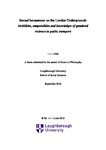Sexual harassment on the London Underground: Mobilities, temporalities and knowledges of gendered violence in public transport
| dc.contributor.supervisor | Saukko, P | |
| dc.contributor.supervisor | Lumsden, K | |
| dc.contributor.author | Lewis, Sian | |
| dc.contributor.editor | Saukko P | |
| dc.contributor.editor | Lumsden K | |
| dc.date.accessioned | 2022-04-11T10:29:54Z | |
| dc.date.available | 2022-04-11T10:29:54Z | |
| dc.date.issued | 2019-03-18 | |
| dc.date.submitted | 2018-09-19 | |
| dc.identifier.uri | http://hdl.handle.net/10026.1/19027 | |
| dc.description.abstract |
This thesis explores women’s experiences of sexual harassment on the London Underground network. Taking a qualitative approach, 29 semi-structured interviews with women who have experienced harassment and 15 semi-structured interviews with members of the British Transport Police form the basis of this study. The originality of this thesis is two fold. Firstly, it offers an empirical analysis of women’s experiences of sexual harassment in the London Underground, in a situation where sexual harassment in public transport has mainly been studied in the Global South. Secondly, using a novel conceptual framework built around the concepts of space, mobilities and rhythm, temporalities and knowledges, this research opens up a new perspective at the intersections of feminist research on gendered violence and a mobilities perspective. The study demonstrates that: urban space and transport are experienced in a gendered way; mobilities and rhythms intertwine with space, shaping how sexual harassment is perpetrated and how women experience it in public transport; that memories and the impact of sexual harassment are negotiated over time and space, and; that knowledge of sexual harassment is situated, varying from different perspectives (victims, police), depending on how a knowledge base is constructed. This thesis as a whole makes an important contribution to our understanding of a particular form of gendered violence happening within the transitory space of an underground in a major Western metropolis. By using the concepts of mobilities, temporalities and knowledges, this thesis provides insight into how women anticipate, experience, react to and remember sexual harassment in transport. It shows how these incidents impact on their mobilities in the city without reducing their reactions to feelings of fear and vulnerability, highlighting that the way in which women negotiate sexual harassment is often done to minimise and resist the impact of these male intrusions and reclaim space in the city | |
| dc.language.iso | en | |
| dc.title | Sexual harassment on the London Underground: Mobilities, temporalities and knowledges of gendered violence in public transport | |
| dc.type | thesis-dissertation | |
| plymouth.organisational-group | /Plymouth | |
| plymouth.organisational-group | /Plymouth/Faculty of Arts, Humanities and Business | |
| plymouth.organisational-group | /Plymouth/Faculty of Arts, Humanities and Business/School of Society and Culture | |
| plymouth.organisational-group | /Plymouth/Users by role | |
| plymouth.organisational-group | /Plymouth/Users by role/Academics | |
| rioxxterms.licenseref.uri | http://www.rioxx.net/licenses/all-rights-reserved | |
| rioxxterms.type | Thesis |


